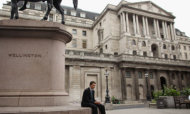The Bank of England has slashed its growth forecasts for the next two years and warned inflation will not fall as quickly as hoped, blaming the ongoing threat posed by the eurozone crisis.
Bank of England governor Sir Mervyn King said there is the "risk of a storm heading our way from the Continent" as he said the situation in the eurozone is the greatest threat to Britain's recovery.
Sir Mervyn announced that growth forecasts for the next two years have been cut from 1.2% to 0.8% for 2012 and from around 3% to around 2% in 2013.
The Inflation Report predicted Britain's economy will not return to a "pre-crisis level before 2014, some six years after the start of the recession".
The squeeze on consumer spending will also keep its grip as inflation falls slower than expected.
It is now not forecast to reach the Government's 2% target for the "next year or so" and is due to end the year at around 2.5%.
Sir Mervyn said the recovery is likely to be "slow and uncertain" as the economy continues to face "strong headwinds".
The battle to escape recession will be hampered by the loss of output due to the Queen's Diamond Jubilee celebrations , the Bank said.
The four-day holiday weekend may encourage some people to take longer breaks or encourage businesses to arrange extended closures, resulting in an expected GDP reduction of 0.5%.
There was similar impact with last year's Royal Wedding, when growth was reduced by around 0.4%.
This time it is expected to make it harder for the UK economy to pull out of recession in the second quarter of the year.
Sky News economic editor Ed Conway said: "This double dip recession is going to be oing on for a little bit longer yet."
However, the third quarter of 2012 is set to receive a boost by increased spending around the London Olympics and as it picks up from the fall in output from the Jubilee.
The Bank said it did not have a "meaningful way" of factoring into its projections an extreme financial event like the collapse of the euro but made clear the single currency posed the biggest risk to the UK recovery.
"We are navigating through turbulent waters, with the risk of a storm heading our way from the continent," Sir Mervyn said.
Alluding to Manchester City's victory at the weekend , he added: "Uncertainty can sometimes add a certain spice to life - as we saw vividly in the conclusion to the Premier League season at the weekend - but it has the opposite effect on the economy. We don't know when the storm clouds will move away."
Howard Archer, European economist at IHS Global Insight, said the Bank had not given any strong indication over whether it was likely to inject further stimulus into the economy.
The programme of asset purchases, known as quantitative easing (QE), has been paused after pumping £325bn pounds into the economy since March 2009.
"We suspect that the Bank of England would prefer not to do more QE, but is prepared to act if underlying economic activity fails to improve," Archer said.

No comments:
Post a Comment